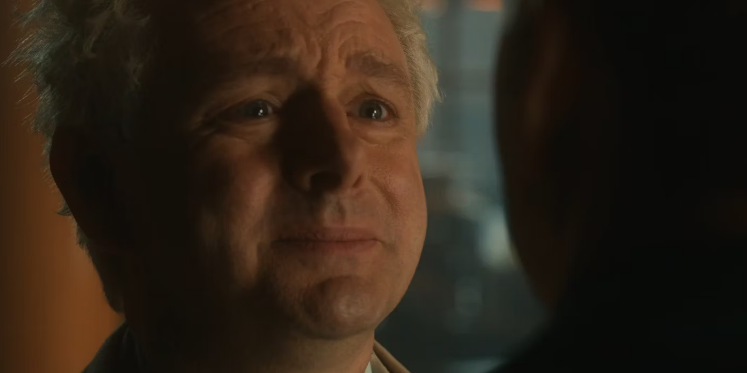Aziraphale’s Final Good Omens Season 2 Line Is More Heartbreaking Than You Think
In the Good Omens season 2 finale, Aziraphale repeats a line to Crowley that is more heartbreaking than it seems, and it reveals his biggest weakness.
The Good Omens season 2 finale is much more heartbreaking due to the deeper meaning behind one of Aziraphale’s final lines. Good Omens’ second season spent more time showing flashbacks of Aziraphale and Crowley’s history, right back to when they first met when Crowley was an angel and creating parts of the universe. As many hoped, their romantic relationship became much deeper, which made it all the more heartbreaking at the end of Good Omens season 2 when Aziraphale rejected Crowley so that he could take on the role of Supreme Archangel in heaven.
In season 2, the series continued to question the morality of Heaven’s decisions after the world almost ended in the Good Omens season 1 finale. Gabriel’s amnesia and the revelation of his and Beelzebub’s relationship showed Aziraphale and Crowley were not the only ones who viewed morality as black and white. Gabriel and Beelzebub’s relationship mirrored Aziraphale and Crowley’s in the sense it was a slow burner between two people who should theoretically be fighting. Sadly, while Beelzebub and Gabriel manage to commit to one another, Crowley and Aziraphale’s relationship burns out when Aziraphale rejects Crowley’s kiss and proposal of running off together.
Aziraphale’s Final Line Parallel’s The Moment Heaven & Hell’s War Began

Aziraphale and Crowley’s ending in season 2 of Good Omens becomes even more heartbreaking when Aziraphale tells Crowley, “Nothing lasts forever.” The moment comes just before Crowley kisses Aziraphale, when he begs Aziraphale to not take the Supreme Archangel role in Heaven and to stay at the bookshop, with him. Aziraphale responds, “Nothing lasts forever,” which is ultimately the final line of their relationship, but it is even more heartbreaking as it’s one of the first things Aziraphale ever said to Crowley. When Crowley is creating the universe, Aziraphale tells him it is a shame it will only last 6,000 years, due to the plan Heaven has for the Apocalypse.
In response to Crowley’s objections and ultimate sadness of the destruction, Aziraphale attempts to comfort him by saying, “Nothing lasts forever.” This scene shows that the moments when Crowley starts to question God’s intentions and these doubts, which other soon-to-be demons also have, are what start the rebellion in Heaven. The rebellion turns into an ongoing war between Heaven and Hell and puts Aziraphale and Crowley on two separate sides. Aziraphale repeating this line when he rejects Crowley emphasizes that they are still on two different sides, and are now further away from each other than ever before due to Aziraphale choosing Heaven over Crowley.
Aziraphale’s Belief That “Nothing Lasts Forever” Reveals His Biggest Weakness

Aziraphale’s belief that “nothing lasts forever” reveals his biggest weakness of being unable to criticize Heaven for its actions. He has always been more reluctant to break the rules compared to Crowley, and tries to justify it when he does. Although he did become more comfortable going against Heaven as Good Omens progressed, he still had an underlying belief that Heaven is ultimately the good guys, and therefore Hell must be bad. Aziraphale says ,“Nothing lasts forever” as a justification for being passive to the rules of the higher-ups.
Crowley believes that Aziraphale understands that morality is black and white, but Aziraphale accepting the job in Heaven shows this is not true. When it comes down to it, Aziraphale may not have wanted Earth destroyed, but he still did not think Heaven was wrong for their actions. Aziraphale’s biggest weakness is his inability to truly cut away from Heaven to stand up to them because he does not actually believe they are bad. That is why he chooses a promotion in Heaven over his true feelings for Crowley because he thinks Heaven just needs better leadership, not that Heaven has been morally wrong throughout Good Omens.

